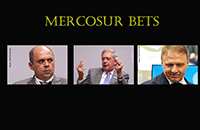

MERCOSUR Bets for Bids
January 2026. The EU-MERCOSUR Agreement is concluded – provisionally. The EU has taken back credibility to negotiate trade deals, the European Parliament may approve it, but at stake is implementation. Billions of EU subsidies may silence the European agrolobby’s opposition short-term, but bets are still open for more attractive bids by EFTA, the European Free Trade Association, by China, or the United States. Why is Bolivia, a full member of Mercosur rarely mentioned?
In the interview with B2Bioworld, Uruguay’s former Agriculture Minister provides insights into the workings of MERCOSUR and the deal with the EU. What appears as a “trade bloc” unveils itself as a loose federation of countries which are pursuing their own national interests. A critical look at Italy's populist negotiation ploy, including voices and perspectives from South America.
A deeper enquiry into the stakes, MERCOSUR’s internal politics, deforestation, gaps in pesticide regulations, beef, fishing, and fruit sectors revisited country by country (including Bolivia’s imports/exports), and the build-up of logistics infrastructures.Reading time: 43 min
Read Now: |
Other articles recommended
B2Bioworld offers you background information
U.S. – EU relations: Europe’s Dignity against Monkey Business - Déjà vu
What former EU Commission President had to say a few years ago about the reappearence of Trumpism
CETA: “Of course, implementation!”
Philippe Couillard, Premier of Québec and Pierre-Marc Johnson, Chief Negotiator of the Province for the EU-Canada free trade agreement on hopes and a treaty not yet implemented.
CETA: Implementation … But which one?
Business interests and attention to development of regions such as Québec, Bavaria, Wallonia, or Northern Ireland
Corporate Compliance: Training the paper tiger to purr, show its teeth, or jump on
Michael Andreas Schulz, CFO and Compliance Officer, Bayer CropScience describes the workings of the system
“We have some of the biggest databases in the world…”
"Failure is part of our business" ... but
Reinhard Pfeiffer, CEO München Messe on balancing geopolitical risks in Russia, China, South Afica and elsewhere. Perspectives in the Americas.
Plant Genetic Engineering: ”It’s not as simple as Yes or No !”
Nobel Laureate Prof. Christiane Nüsslein-Volhard Warns of GMO-populism and researchers not standing up